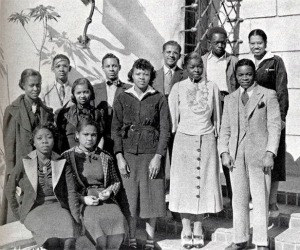SDSU Celebrates Black History Month
The Office of Intercultural Relations, the Cross Cultural Center and other campus organizations offer various events this February.

In 1926, African-American historian Carter G. Woodson pioneered the first “Negro History Week” during the second week of February. 85 years later, the monthlong celebration continues to be observed nationwide, including at San Diego State University.
“Each time we do a Black History Month program, we try to introduce (people) to different figures from the (African-American) community (and) from national and historical perspectives so that the history of African Americans can be seen from a variety of lenses,” said Tanis Starck, director of SDSU’s Office of Intercultural Relations and Cross Cultural Center.
In conjunction with campus organizations, including the Department of Africana Studies and the Afrikan Student Union, the Office of Intercultural Relations and the Cross Cultural Center have organized this year’s celebration of Black History Month at SDSU.
Events during February
The celebration begins on Feb. 1 with “The History of Black History” seminar from 4 to 7 p.m. at Casa Real in Aztec Center. The seminar will focus on the history of the celebration and encourage more awareness about social justice issues within the African-American community.
Other events include:
- Feb. 2 – “History of Black Women,” 6–8 p.m., Casa Real in Aztec Center
- Feb. 8 – “Colorblind Racism and Impact of Islam on Black America,” 4–6:40 p.m., Casa Real in Aztec Center
- Feb. 15 – Lecture by Omali Yeshitela, 4–7 p.m., Montezuma Hall
- Feb. 16 – “Black is the New Color,” 6–8 p.m., Scripps Cottage
- Feb. 23 – “The Music in Me,” 6–8 p.m., Scripps Cottage
Notable African Americans throughout SDSU’s history
From federal judges to NFL head coaches, a myriad of prestigious African Americans have crossed paths with SDSU.
In 1998, longtime SDSU librarian Robert Fikes Jr. began compiling what eventually became “The Black in Crimson and Black: A History and Profiles of African Americans at SDSU,” which profiles prominent African Americans throughout SDSU’s history.
The collection includes the first African-American graduate from then-San Diego Normal School — Henrietta Goodwin, who graduated in 1913 — as well as the first African-American faculty member, Beatrice Green Markey, who was hired as an assistant political science professor in 1956.
“I was so fascinated with what I call the earliest (black) pioneers (at SDSU) that I started doing (an) investigation,” Fikes said.
Other notable blacks who have been affiliated with SDSU include:
- Olympic long jump gold medalist Willie Samuel Steele
- U.S. District Court judges Earl Gilliam and Napoleon A. Jones
- Oakland-Raiders-linebacker-turned-actor Carl Weathers
- U.S. Ambassador Roland Bullen
- MLB Hall of Famer (and current SDSU head baseball coach) Tony Gwynn
SDSU Department of Africana Studies
While Black History Month only lasts 28 days during February, students in the SDSU Department of Africana Studies are engulfed in it year-round. The department, created in 1972, has evolved from a focus on Afro-Americans, to an emphasis on African Americans, to the present curriculum that includes African Americans, the African diaspora and Africans.
“While its focus is specifically on Africans or African Americans, it teaches students really how to live in a world with other people and to objectively examine material that comes from a different perspective,” said Shirley Weber, chair of the department and one of the program’s founding members.
“Our students find that it’s beneficial if they’re going to work in any area in the United States or around the world because it does give them a much more global feel for knowledge and for alternative points of view,” she added.
As the department continues to develop, more emphasis is being placed on strengthening the study abroad programs, increasing outreach to scholars around the world who want to learn more about Africana studies at SDSU, creating a graduate program, and maintaining and expanding its collaborations with other SDSU departments.
For more information about the Department of Africana Studies, call 619-594-6531, or e-mail [email protected].



